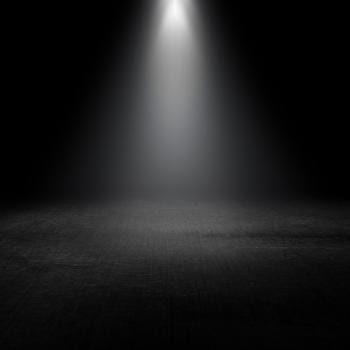By Gregory
Many of us have read the work of the New Atheists or encountered those influenced by them. I’d imagine many of us have replied to their assertions with a phrase similar to, “I don’t believe in that sort of God either.” The phrase indicating that we don’t ascribe to the immature, unrealistic visions of Divinity that the New Atheists usually attack. Admittedly, such gods are soft targets.
Yet that phrase represents only half the matter – only half the conversation. What needs to follow is the earnest dialog concerning what kind of God do you affirm?
Such is hard work.
In my previous post I outlined why I can’t accept visions of a Divine Santa-God. By this, I mean almost juvenile concepts of God that feature God as best friend, personal attendant, wish-granter, and projection of ego and personal judgment in the world. The God who talks to you each morning and strokes your ego, fuels your OCD, and helps you control others. Such a Divinity more closely resembles Santa-Claus than the God of the scriptures, and even more importantly, the God of reality.
Saying one doesn’t believe in such a saccharine deity is only half the matter – the other half is beginning the work of elucidating the sort of Divinity you do affirm.
What is your God like? How realistic is such a vision? Can such a God bring about transformation? Is such a God worthy of worship? Where does such a God come from? How do you know your vision has any merit?
Humility is a fundamental theological virtue. None of us has seen God. We don’t have pure, unmitigated experiences of the Divine. When we speak about God, we are always speculating, conjecturing, even posturing.
Our ideas of God come from our parents, our religious communities, our culture, our educational experiences, our reading, and our own life experiences. Our experience and thinking of God is always mediated through these things.
I want a God that makes sense and doesn’t require constant mental gymnastics.
I don’t want to have to make excuses for God. I don’t want to have to appeal to “how he works in mysterious ways (which is bullshit wrapped in wishful thinking). I don’t want to be left wondering why God seemingly let us down, didn’t show up, or allowed something to happen that I wouldn’t let occur to my worst enemies.
I want a God that aligns with a full view of scripture. I want a God that doesn’t conflict with science or our better judgments about reality.
I want a God that isn’t pie-in-the-sky, bat shit crazy, juvenile projections of namby-pamby soft-self – you get the idea.
I want a God who is still standing after considerations of the Holocaust, cancer in five year olds, miscarriages, disappointments, accidents, earth-quakes, random killings, lay-offs, and broken hearts.
I know that such a God does not reside in the mainstream theology of most Evangelical or even mainstream Protestant or Catholic thought. I don’t usually find such a God in Orthodox Judaism or Eastern Orthodoxy either. Most comfortable Reform Jewish communities don’t promote realistic a deity either. Not at least in the surface theology and typical droll, lifeless, middle-class liturgies that afflict most parishes, congregations, and communities.
I’ve learned that the God I’m after – and who is after me – is closer to the God of Tillich, Armstrong, Heschel, Buber, Hart, Kaplan – it’s certainly not the God of the atheists, or even of most theists – it’s the God of the anatheists, the process theologians, the honest thinkers; those who have wrestled with God and found the typical, traditional expressions and theories wanting.
It’s the God many of us are afraid to encounter – because it means giving up our spiritual childhood.











